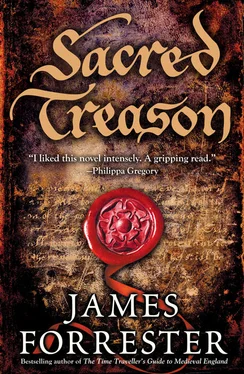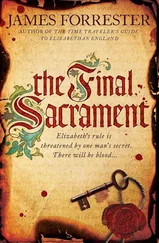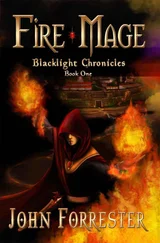James Forrester - Sacred Treason
Здесь есть возможность читать онлайн «James Forrester - Sacred Treason» весь текст электронной книги совершенно бесплатно (целиком полную версию без сокращений). В некоторых случаях можно слушать аудио, скачать через торрент в формате fb2 и присутствует краткое содержание. Жанр: Исторический детектив, на английском языке. Описание произведения, (предисловие) а так же отзывы посетителей доступны на портале библиотеки ЛибКат.
- Название:Sacred Treason
- Автор:
- Жанр:
- Год:неизвестен
- ISBN:нет данных
- Рейтинг книги:4 / 5. Голосов: 1
-
Избранное:Добавить в избранное
- Отзывы:
-
Ваша оценка:
- 80
- 1
- 2
- 3
- 4
- 5
Sacred Treason: краткое содержание, описание и аннотация
Предлагаем к чтению аннотацию, описание, краткое содержание или предисловие (зависит от того, что написал сам автор книги «Sacred Treason»). Если вы не нашли необходимую информацию о книге — напишите в комментариях, мы постараемся отыскать её.
Sacred Treason — читать онлайн бесплатно полную книгу (весь текст) целиком
Ниже представлен текст книги, разбитый по страницам. Система сохранения места последней прочитанной страницы, позволяет с удобством читать онлайн бесплатно книгу «Sacred Treason», без необходимости каждый раз заново искать на чём Вы остановились. Поставьте закладку, и сможете в любой момент перейти на страницу, на которой закончили чтение.
Интервал:
Закладка:
Clarenceux started to pull on his boots. “I know it is bad, Thomas, but I fear for his life. Tell my wife where I am, if she asks for me. I’ll be back by dawn.”
6
Clarenceux and Thomas were not the only men awake that night. Across London, in dark bedchambers, dozens of people were stirring uneasily at the sound of thunder and heavy rain. Some men were lying beside their wives, imagining the mud on the roads in the morning or worrying about money, or disease, or business, or God, or death. Women were awake, listening to their husbands’ snoring or their children crying, or the breathing of babies in cradles beside them, hoping that they would survive the cold nights of winter. And a few lay thinking of the searches for heretical texts and the brutal beatings and trials of those who were found practicing the old faith. Had God deserted them? Was this what their queen wanted for them: to be terrorized into this new Protestant faith? Everyone was in darkness, feeling their way around bedchambers, cradles, fears, doubts, injustices.
Among those who were not sleeping were two richly dressed men in a large, high-ceilinged room of a grand new house on the Strand. One of them was in his early forties. His clothes were formal: a deep red velvet robe with gold buttons and shoulder studs, and an elaborate chain of office upon his shoulders. He wore a small ruff around his neck, which was almost concealed by the folds of the hood of the robe. His long, reddish-brown beard was full, and his mustache equally so. His eyes were tired-there were folds of skin beneath them-but they were not unkind. His middle fingers were laden with rings. He was standing, concentrating on a paper document, which he now set down on a fine linen-covered table. Leaning forward, he marked the paper with a quill pen. Cecil. He put the pen back on its holder and reached for a cup of wine.
“More traitors, Sir William?” asked his companion, who had been waiting for some while.
“More than ever, Francis. This business is like killing beetles. You see one, and you pick up a stone nearby to crush it, and in so doing you find a dozen more of the damned things crawling around beneath that stone.” Cecil lifted another paper, glanced at it, and then shifted his gaze to the other man. “Talking of crushing, this informer of yours, is he going to live?”
Francis Walsingham was a small, neat man of thirty-one. His black beard and mustache were trimmed short. His hair had begun to recede on the sides, forming a widow’s peak; this he tried to cover up with a black cap that fitted tightly to his head. He was dressed entirely in black-doublet, hose, and robe-apart from his white ruff and a single gold ring. Although small, he had the look of an ambitious man, not a compassionate one. He did not smile often, and when he did, it did not signal pleasure so much as the achievement of a personal goal.
“So Draper is my informer now, is he, Sir William?” Walsingham walked toward the fireplace. He opened his robe to feel the heat and stood looking into the flames. “He will live. Probably. I do not greatly care. How much he knows is what interests me.”
“You have no more information about his attacker?”
“No. It was stupid of Crackenthorpe to kill him. The pistol was German, very expensive, but anyone of rank could have bought it. The knives were from various makers in London and the north. They tell us nothing.”
“So, what are you going to do?”
“I have not decided. If we let him go, will he act as bait? Or will he warn Machyn and the others?”
Cecil set down his paper. “I do not believe we have a choice. If he will not tell us about the chronicle, it is likely that he knows little or nothing about it. I’m sure you have tried your usual methods. We must be more imaginative, more creative.”
Walsingham walked toward his patron and lifted a goblet from the table. “That would be dangerous.”
“Our situation was far more dangerous before the message came from Scotland. Only we did not know it.”
Walsingham nodded. “I did think of burning Machyn’s house on the assumption that we would destroy everything inside, including the chronicle.”
“Fires are dangerous in London.”
Walsingham’s eyes narrowed. “What concerned me was that we would be unable to verify the chronicle was there. We would always be worried that he had given it to one of the other so-called Knights of the Round Table. How many of them are there? Draper said four, but that seems too few. So we do not know. But I do know you could not look her majesty in the eye and tell her that you simply think that the chronicle has been destroyed. Lord Dudley would pour scorn on you-and in front of her. You would be forced from her presence.”
Cecil did not react. Walsingham was often direct like this with him, to the point of rudeness. He was the same with others too, even the queen herself. It was an unfortunate side effect of his intense focus, his determination to achieve results. It was best ignored.
“I am not going to fail her, Francis,” Cecil replied calmly, looking at the next item on the pile of papers. “You might be too young to remember her brother’s settlement of the throne but, believe me, it still rankles with her majesty.”
Walsingham noted the comment about his age. “I might be younger than you, Sir William, but I know. You signed the document by which King Edward disinherited both his sisters…”
Cecil looked up sharply. “So did Dudley’s father, the duke of Northumberland.”
“But when King Edward was dead, and Mary seized power and executed Jane Gray, you blamed Northumberland entirely. You stood by and let him be executed as well. And now his son is her favorite. In jumping between these stepping stones, you have only narrowly avoided being swept away by the torrent.”
Cecil retained his composure. “I sometimes suspect that you forget to whom you are speaking. I was only a witness of that disinheritance, not the protagonist.”
Walsingham set his cup down carefully on the table. He looked Cecil straight in the eye. “I never forget to whom I am speaking, especially not when it’s you, Sir William. I am grateful for your patronage every hour of the day. I am grateful for my place in Parliament. But you would not continue to value me if I forgot your weaknesses. You should pay more attention to them yourself. And every lie you utter is a weakness, for every lie is a hostage to the truth. I know you were more than a witness. You confessed as much to the late queen. I heard so from those who were there.”
Cecil hesitated, then made himself smile. “True, Francis. How true. I too would have been executed if it had not been for the late queen, God rest her soul. And her sister, our blessed Elizabeth, God grant her long life.” He paused, allowing Walsingham to try to guess what he might say next. “It is somewhat ironic that I should be so profoundly grateful to a Catholic queen as well as a Protestant one. Do you not agree?”
Walsingham said nothing. It was not ironic; it was a mark of Cecil’s genius. And he, Walsingham, knew it more than anyone. Anyone, that is, except Elizabeth herself.
He wandered back toward the fireplace. “The reason I came this evening is not to delight you with my manners. I am aware that certain talents, such as flattery, are quite beyond my abilities. Nor can I debate the finer points of religious tolerance and treason with you. I am more interested in finding these Knights of the Round Table. Like you, I do not think that Draper knows more than he has already told us. He is a coward, like most selfish men. He would not have given us the name of Henry Machyn or told us about the chronicle if he was trying to conceal the plot. So, I propose that we let him go-to be bait on the end of our fishing line-and that we watch him. But when we get Machyn, or any of his accomplices, how far do we go to get the truth?”
Читать дальшеИнтервал:
Закладка:
Похожие книги на «Sacred Treason»
Представляем Вашему вниманию похожие книги на «Sacred Treason» списком для выбора. Мы отобрали схожую по названию и смыслу литературу в надежде предоставить читателям больше вариантов отыскать новые, интересные, ещё непрочитанные произведения.
Обсуждение, отзывы о книге «Sacred Treason» и просто собственные мнения читателей. Оставьте ваши комментарии, напишите, что Вы думаете о произведении, его смысле или главных героях. Укажите что конкретно понравилось, а что нет, и почему Вы так считаете.












